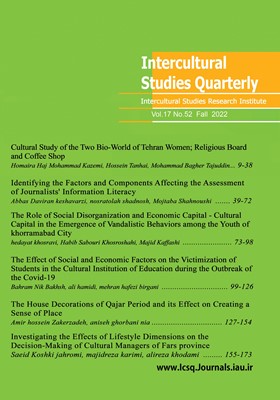Cultural Study of the Two Bio-World of Tehran Women; Religious Board and Coffee Shop
Subject Areas : INTERCULTURAL STUDIES QUARTERLYHomaira Haj Mohammad Kazemi 1 , Hossein Tanhai 2 * , Mohammad Bagher Tajuddin 3
1 - Ph.D. student of Cultural Sociology, Faculty of Social Sciences, Communication and Media, Central Tehran Branch, Islamic Azad University, Tehran, Iran.
2 - Associate Professor, Department of Sociology, Faculty of Social Sciences, Communication and Media, Central Tehran Branch, Islamic Azad University of Tehran, Iran.
3 - Assistant Professor, Department of Social Sciences, Faculty of Social Sciences, Communication and Media, Central Tehran Branch, Islamic Azad University of Tehran, Iran.
Keywords: modernism, tradition, Lived experience, Religious Broad, Coffee Shops,
Abstract :
The present study deals with the qualitative study of the two bio-worlds of women in Tehran by the religious board and the coffee shop, and the meanings, interpretations and symbols that these two groups of women express themselves are analyzed. A qualitative study in this study shows that identity factors have changed fundamentally over the past two decades, so that today Iranian women are very different from the past. The present study is based on interpretive paradigm and qualitative phenomenological research method with thematic analysis technique (theme) in Tehran. The study population of this article is women in Tehran, from which 42 people have been selected by theoretical sampling method and the information has been collected and rewritten through in-depth interviews. The research shows that the categories obtained in the formation of women's identity can be expressed in the following cases: fluid leisure, the effect of coffee shop music, the heterogeneous combination of tradition and modernism in individuality, the prevalence of religious childhood on the mental wall of activists, spiritual guidance, belief, migration and the need to reproduce the meaning of religion in the formation of identity, the dialectic of spirituality in the impact of need and sin, feminine ignorance due to prejudice, the domination of patriarchal culture and a way for women to pass, the duality of cafe and group, heterogeneous homogeneity, the deconstruction of communication, the incompatibility of modern bodies with the essence of spirituality, the combination of pleasure and spirituality, the romantic action of the heathers, the reconstruction of spiritual dialogues. The results show that when we are going to look at the formation of women's identity in today's Iranian society, we must first pay attention to the components of their influence on the religious identity that arises from the family or school. On the other hand, the emergence of new modern forms such as coffee shops in this area can have an impact on the mentality and personality of women. Women are also taking turns in changing their mental direction. In such a way that the type of attitude is not necessarily considered anti-spirituality and religion, but shows differences with the traditional religious view. On the other hand, their presence in modern places such as coffee shops shows that the acceptance of modernism in today's generation of women is undeniable.
آزاد ارمکی، تقی و وحید شالچی (1384)، دوجهان ایرانی؛ مسجد و کافیشاپ، مجله مطالعات فرهنگی و ارتباطات، دوره 1، شماره 4.
آزاد ارمکی، تقی (1387)، جامعهشناسی فرهنگ، نشر علم.
برگر، پیتر و بریجیت کلنر (1387)، ذهن بیخانمان، ترجمه محمد ساوجی، تهران: نشر نی.
خاکسارفرد، عطیه و صدیقه سوری (1396)، فهم پدیدارشناسانۀ تجربۀ زیستۀ زنان از حضور در مجالس مذهبی زنانه، راهبرد فرهنگ، ش 38.
دستوری، مژگان (1389)، بررسی دگرگونیهای هیئتهای مذهبی زنانه: هیئتهای سنتی و نوین، فصلنامه مطالعات زنان، سال هشتم، ش 1.
زیمل، جرج (1386)، مقالاتی دربارۀ تفسیر در علم اجتماعی، ترجمه شهناز مسمی پرست، تهران: شرکت سهامی انتشار.
شریعتی، سارا (1391)، سخنرانی در نشست زنان و نوگرایی دینی.
کاظمی وریج، عباس، فیاض، ابراهیم و دستوری، مژگان (1395)، گونه شناسی هیئتهای مذهبی زنانه در تهران، نشریه مطالعات جامعه شناختی، پیاپی ۳۶.
کرمی، محمدتقی و عطیه خاکسارفرد و وحید شالچی و نهال نفیسی (1400)، تعارضات و همسوییها در ساخت مجالس زنانه شهر تهران، مجله مطالعات راهبردی زنان، دوره 23، شماره 92، صص 131-109.
ماکویی، سویل (1393)، ویژگیهای مردم شناختی کافیشاپ با شیوه زندگی جوانان، مجله فرهنگ مردم ایران، ش 36.
مقدس جعفری، محمدحسن و رضا دوست کریم و خدیجه گلبریان (1391)، بررسی تأثیر عوامل فرهنگی بر سبک زندگی جوانان کافیشاپ در شهر اهواز، مجله جامعهشناسی جوانان، دوره 3، شماره 7.
محمدی، الناز و عباس زاده محمد (1395)، سیر تاریخی نظریات جامعهشناس کلاسیک ماکس وبر، سومین کنفرانس بینالمللی پژوهشهای نوین در علوم انسانی.
محمدپور، احمد (1390)، روش تحقیق کیفی، ضد روش، تهران: انتشارات جامعه شناسان.
Creswell, J.W (1998), Qualitativecinquiry and research design: choosing among five traditions, sage publication Ltd.
Giddens,Anthony (2019), The Transformation of Intimacy, uk:Stanford University of press
Etzrodt, C (2012), Advanced Modern Versions of Max Weber’s Action Concepts. Ritsumeikan Social Sciences Review. VOL (627), 3, 23-41.
Cuneo, Michael (2020), Values and Meaning: Max Weber's Approach to the Idea of Ultimate Reality and Meaning, Fordham University, New York, NY, U.S.A
_||_
